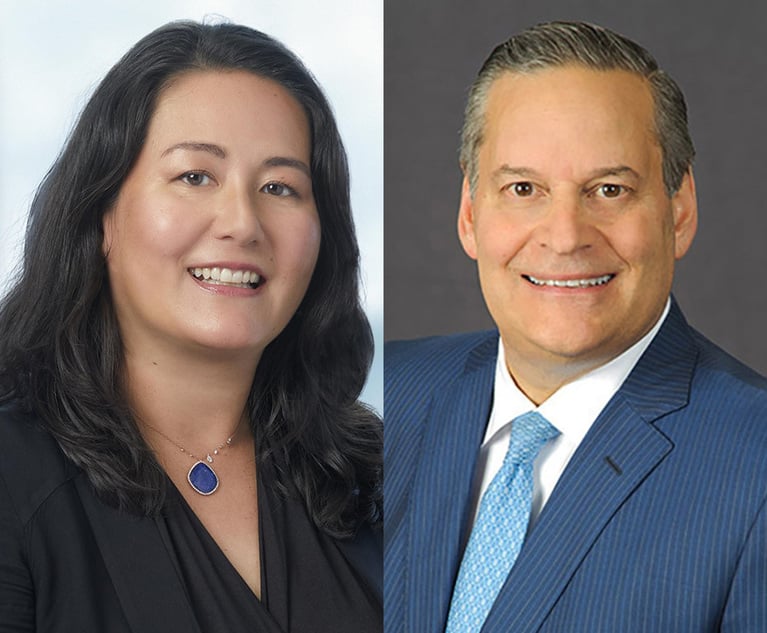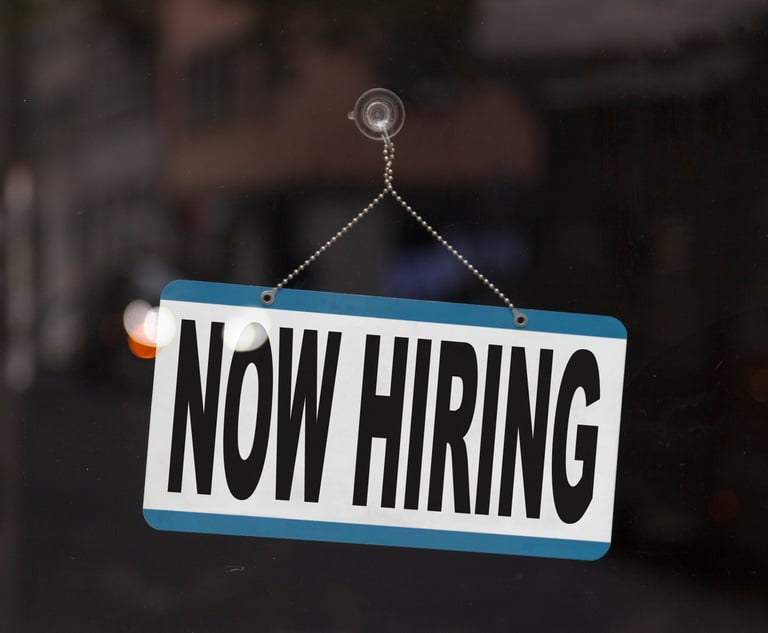 David Okech, associate professor, University of Georgia School of Social Work and member of a section of the Georgia Governor's Human Trafficking Task Force. (Courtesy photo)
David Okech, associate professor, University of Georgia School of Social Work and member of a section of the Georgia Governor's Human Trafficking Task Force. (Courtesy photo)UGA Prof Calls for Action Against Forced Labor
"We are working to expand understanding of labor trafficking and its impact on foreign-born workers in Georgia," David Okech said. "While much has been done in the state to identify and combat sex trafficking, there is still little known about labor trafficking and data are hard to come by. "
August 27, 2019 at 02:36 PM
3 minute read
A University of Georgia professor working on efforts to end human trafficking said Tuesday that forced labor may at least as big an industry as sexual servitude.
David Okech, an associate professor in the University of Georgia School of Social Work, is a member of a section of the Georgia Governor's Human Trafficking Task Force that focuses on the plight of foreign-born adult victims of labor trafficking. Okech also leads the African Programming and Research Initiative to End Slavery, which is funded by the U.S. State Department's Office to Combat and Monitor Trafficking in Persons. The international project is collecting data on child trafficking in parts of West Africa to aid intervention efforts and reintegration programs for survivors.
Okech called for more investigation into labor trafficking in a UGA news release Tuesday.
"We are working to expand understanding of labor trafficking and its impact on foreign-born workers in Georgia," Okech said. "While much has been done in the state to identify and combat sex trafficking, there is still little known about labor trafficking and data are hard to come by. The data we gather will inform work in support of sex and labor trafficking victims in Georgia."
While Georgia has seen some litigation over guest agricultural workers exploited with little to no pay or food under threats of deportation, generally victims stay out of sight, Okech said.
"Trafficking victims are a hard-to-reach population. Without baseline data, it is difficult to measure the problem, which makes it difficult to know if any interventions are effective," he said. "In West Africa a young person is more likely to be trafficked primarily for labor, which actually is estimated to be more prevalent worldwide than sex trafficking. In both the U.S. and sub-Saharan Africa a person who is labor-trafficked may appear malnourished or exhausted, show signs of physical injuries and abuse, avoid eye contact or be fearful."
The professor said everyone can try to be informed and look for the signs of trafficking. Information can be shared with the federal anti-trafficking hotline 1-866-347-2423. The UGA news release included a link to educational materials on the U.S. Department of Homeland Security "blue campaign" to end human trafficking.
This content has been archived. It is available through our partners, LexisNexis® and Bloomberg Law.
To view this content, please continue to their sites.
Not a Lexis Subscriber?
Subscribe Now
Not a Bloomberg Law Subscriber?
Subscribe Now
NOT FOR REPRINT
© 2025 ALM Global, LLC, All Rights Reserved. Request academic re-use from www.copyright.com. All other uses, submit a request to [email protected]. For more information visit Asset & Logo Licensing.
You Might Like
View All

Sanctions Order Over Toyota's Failure to Provide English Translations of Documents Vacated by Appeals Court
4 minute read
Burr & Forman, Smith Gambrell & Russell Promote More to Partner This Year
7 minute readTrending Stories
- 1Legal Tech's Predictions for Artificial Intelligence in 2025
- 2Tyson & Mendes Appoints Cayce Lynch First Female Nationwide Managing Partner
- 3Spellbook Expands Deeper Into the In-house Market
- 4Here’s Looking at You, Starwood: A Piercing the Corporate Veil Story?
- 5Obtaining an Edge in Appellate Advocacy
Who Got The Work
Michael G. Bongiorno, Andrew Scott Dulberg and Elizabeth E. Driscoll from Wilmer Cutler Pickering Hale and Dorr have stepped in to represent Symbotic Inc., an A.I.-enabled technology platform that focuses on increasing supply chain efficiency, and other defendants in a pending shareholder derivative lawsuit. The case, filed Oct. 2 in Massachusetts District Court by the Brown Law Firm on behalf of Stephen Austen, accuses certain officers and directors of misleading investors in regard to Symbotic's potential for margin growth by failing to disclose that the company was not equipped to timely deploy its systems or manage expenses through project delays. The case, assigned to U.S. District Judge Nathaniel M. Gorton, is 1:24-cv-12522, Austen v. Cohen et al.
Who Got The Work
Edmund Polubinski and Marie Killmond of Davis Polk & Wardwell have entered appearances for data platform software development company MongoDB and other defendants in a pending shareholder derivative lawsuit. The action, filed Oct. 7 in New York Southern District Court by the Brown Law Firm, accuses the company's directors and/or officers of falsely expressing confidence in the company’s restructuring of its sales incentive plan and downplaying the severity of decreases in its upfront commitments. The case is 1:24-cv-07594, Roy v. Ittycheria et al.
Who Got The Work
Amy O. Bruchs and Kurt F. Ellison of Michael Best & Friedrich have entered appearances for Epic Systems Corp. in a pending employment discrimination lawsuit. The suit was filed Sept. 7 in Wisconsin Western District Court by Levine Eisberner LLC and Siri & Glimstad on behalf of a project manager who claims that he was wrongfully terminated after applying for a religious exemption to the defendant's COVID-19 vaccine mandate. The case, assigned to U.S. Magistrate Judge Anita Marie Boor, is 3:24-cv-00630, Secker, Nathan v. Epic Systems Corporation.
Who Got The Work
David X. Sullivan, Thomas J. Finn and Gregory A. Hall from McCarter & English have entered appearances for Sunrun Installation Services in a pending civil rights lawsuit. The complaint was filed Sept. 4 in Connecticut District Court by attorney Robert M. Berke on behalf of former employee George Edward Steins, who was arrested and charged with employing an unregistered home improvement salesperson. The complaint alleges that had Sunrun informed the Connecticut Department of Consumer Protection that the plaintiff's employment had ended in 2017 and that he no longer held Sunrun's home improvement contractor license, he would not have been hit with charges, which were dismissed in May 2024. The case, assigned to U.S. District Judge Jeffrey A. Meyer, is 3:24-cv-01423, Steins v. Sunrun, Inc. et al.
Who Got The Work
Greenberg Traurig shareholder Joshua L. Raskin has entered an appearance for boohoo.com UK Ltd. in a pending patent infringement lawsuit. The suit, filed Sept. 3 in Texas Eastern District Court by Rozier Hardt McDonough on behalf of Alto Dynamics, asserts five patents related to an online shopping platform. The case, assigned to U.S. District Judge Rodney Gilstrap, is 2:24-cv-00719, Alto Dynamics, LLC v. boohoo.com UK Limited.
Featured Firms
Law Offices of Gary Martin Hays & Associates, P.C.
(470) 294-1674
Law Offices of Mark E. Salomone
(857) 444-6468
Smith & Hassler
(713) 739-1250







